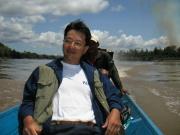経歴
-
2017年04月-継続中
早稲田大学 人間科学学術院 教授
-
2023年04月-2024年03月
筑波大学 人文社会国際比較研究機構(ICR) 客員研究員
-
2020年09月-2022年09月
早稲田大学 大学院人間科学研究科 研究科長
-
2020年09月-2022年09月
早稲田大学 人間科学学術院 副学術院長(国際担当)
-
2004年08月-2017年03月
東京大学 大学院農学生命科学研究科 教授
-
1996年04月-2004年08月
東京大学 大学院農学生命科学研究科 助教授
-
1995年11月-1996年03月
東京大学 農学部 助教授
-
1991年04月-1995年10月
東京大学 農学部 助手
-
1990年01月-1991年03月
Forestry and Forest Products Research Institute, Japan 林業経営部 研究員
-
1990年01月-1991年03月
農林水産省・林野庁・森林総合研究所 林業経営部 研究員
-
1987年04月-1989年12月
インドネシア共和国・教育文化省・ 熱帯降雨林研究センター(東カリマンタン州・サマリンダ市) 研究員(JICA長期派遣専門家)
-
1983年04月-1987年04月
Forestry and Forest Products Research Institute, Japan 林業経営部 研究員
-
1983年04月-1987年04月
農林水産省・林野庁・林業試験場 林業経営部 研究員



Click to view the Scopus page. The data was downloaded from Scopus API in February 18, 2026, via http://api.elsevier.com and http://www.scopus.com .